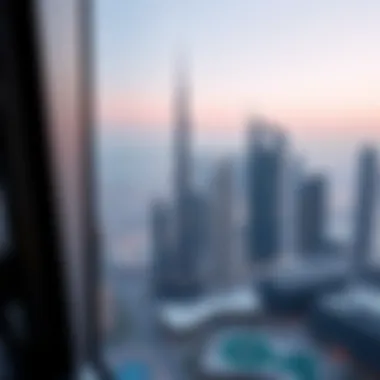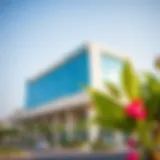Market Dynamics in Dubai: Insights and Trends


Intro
Dubai has evolved from a humble fishing village to a global powerhouse, a beacon for investors, homebuyers, and entrepreneurs alike. The rapid transformation of its market dynamics, particularly in the real estate sector, warrants a thorough exploration. As the dance of skyscrapers and sandy beaches continues, understanding Dubai's property landscape becomes essential for informed decision-making.
With its burgeoning population and strategic location, Dubai becomes an attractive hub for both local and international investors. In this article, we will peel back the layers of Dubai’s extensive market dynamics, going beyond mere numbers to grasp the essence of what makes this city tick. We will dive into trends shaping the real estate sector, analyze the behavior of buyers and sellers, and identify hotspots for investment.
Market Trends and Insights
Current Market Analysis
As of late 2023, Dubai's real estate market shows promising signs of resilience. Despite fluctuations brought on by global economic uncertainties, demand for property continues to surge, a trend that has drawn attention from buyers across the globe.
According to recent reports, the residential market witnessed a year-on-year growth of around 8%. Properties, particularly in areas like Dubai Marina and Downtown Dubai, are seeing increased interest from both individual buyers and institutional investors due to their desirable locations and amenities.
- Key Elements of Current Market Trends:
- Increased foreign investment: The UAE government has implemented policies aimed at attracting global investors, resulting in a favorable environment for property transactions.
- Shift toward sustainability: More developers are incorporating eco-friendly designs and sustainable living practices into their projects.
- Technological integration: Smart home technologies are becoming a standard feature, appealing to tech-savvy buyers.
Historical Trends and Future Predictions
Historically, Dubai's real estate market has experienced its share of ups and downs—each cycle teaching stakeholders valuable lessons. From the property bubble of 2008 to the rebound post-2010, trends often depend on broader economic signals.
Looking towards the future, experts predict:
- Continued growth in luxury property acquisitions, particularly among high-net-worth individuals who see Dubai as a safe haven.
- Expansion in areas like Dubai Silicon Oasis, which is likely to attract tech companies and startups, potentially increasing demand for housing in surrounding neighborhoods.
- An increase in mixed-use developments, blending residential, commercial, and leisure spaces, catering to a growing community.
"Understanding the past can provide a roadmap for the future. The dynamics of Dubai reflect both global trends and local nuances."
Property Listings and Comparisons
Luxury Properties Overview
In Dubai, luxury properties often come with extravagant price tags, but they also provide unparalleled opulence and comfort. High-end developments like the Palm Jumeirah or Burj Khalifa offer sweeping views, exclusive amenities, and prime locations catered to discerning buyers.
- Highlights of Luxury Living:
- Villas with private beaches and access to leisure facilities.
- Apartments featuring cutting-edge designs with state-of-the-art technology.
- Gated communities ensuring privacy and security for high-profile residents.
Affordable Housing Options
Despite the glitz associated with Dubai's luxury offerings, affordable housing is very much a significant part of the ecosystem. As the population expands, the necessity for budget-friendly options has become quite apparent. Areas like Dubai Sports City and International City are emerging as prime choices for families looking for reasonable prices without sacrificing quality of life.
- Key Characteristics of Affordable Housing:
- Close proximity to essential services like schools and hospitals.
- A thriving communal vibe with parks and shared spaces for families.
- Competitive prices often lower than similar properties in other metropolitan areas.
Understanding these dynamics is critical for potential investors and homebuyers. As Dubai continues to grow and evolve, being informed about market trends and property types will remain essential to navigating this unique real estate landscape.
For more information about Dubai's real estate policies and market context, you may visit:
Dubai Land Department, UAE Government
By grasping the nuances of both luxury and affordable segments, stakeholders can position themselves favorably in a market that never sleeps.
Prelims to Dubai's Real Estate Market
Dubai's real estate market has emerged as a colossal force in the global landscape, characterized by rapid growth and diversification. It warrants a close look because the dynamics here have far-reaching implications not only for individuals seeking properties but also for investors, developers, and market analysts alike. The stakes are high, and understanding the nuances of this market is crucial.
Dubai is much more than a tourist hotspot; it stands as a beacon of investment opportunities. The blend between culture, luxury, and modernity creates a unique environment for real estate ventures. Investors often see potential gains due to infrastructure development, diversified economies, and a culturally rich backdrop. However, potential buyers need to grasp more than surface level if they want to navigate this intricate market effectively.
Historical Background
Dubai’s trajectory towards becoming a real estate titan is steeped in visionary planning and strategic initiatives. In the late 20th century, the government recognized the need for economic diversification, moving away from an oil-dependent economy. The establishment of freehold property ownership in 2002 marked a watershed moment. It opened the floodgates for international buyers and led to a construction boom across the emirate.
Post-2008, the market faced turbulence due to the global financial crisis. Prices plummeted, leading many to reconsider investments in the region. Yet, resilience is a hallmark of Dubai; recovery was swift, and by the mid-2010s, property values began climbing once again. Key milestones, such as the Expo 2020, spurred even further investments, making the landscape ripe for both buyers and sellers.
Current Trends
The current pulse of Dubai’s property market shows a complex interplay of affordability and luxury. On the one hand, properties in neighborhoods like Jumeirah Village Circle and Dubai Marina showcase continual demand, primarily driven by young expatriates and families seeking a blend of quality and convenience. On the other hand, luxury real estate remains constant - offerings like villas in Palm Jumeirah command premium prices, attracting affluent investors worldwide.
Trends also reveal a notable shift towards sustainability. Developers are increasingly using green building practices and technology to cater to a more eco-conscious market, making this an essential consideration for any investor.
Understanding these trends can ultimately equip buyers with the knowledge to make informed decisions, minimizing risks and maximizing returns in an ever-evolving market.
The narrative of Dubai's real estate market is as captivating as it is complex. Engaging deeply with its historical roots and current trends not only paints a vivid picture but also provides invaluable insights for stakeholders within the industry.
Types of Properties Available
Understanding the types of properties available in Dubai is vital for anyone looking to invest or relocate in this dazzling city. Each category of properties serves distinct purposes, catering to different needs and preferences. Whether it's for residential, commercial, or luxury use, knowing your options helps create a clearer picture and directs informed decisions. The Dubai real estate sector is versatile, and recognizing the characteristics of each property type can yield benefits such as better financial returns and satisfaction with one’s choice.
Residential Properties


Apartments
Apartments in Dubai have become a household name for many looking for affordable yet luxurious living. One key characteristic of these units is their accessibility. They are often situated in bustling neighborhoods, providing residents with ease of commuting and accessing lifestyle amenities. This makes apartments a popular choice for both expats and locals alike.
Apartments are usually designed with modern aesthetics and offer a range of facilities such as swimming pools, gyms, and parking spaces. However, one thing to consider is the potential for limited space compared to villas. Despite this, the advantages such as lower maintenance costs and proximity to city hotspots make apartments an appealing option for many.
Villas
Villas represent the more spacious end of the residential spectrum. They offer large living areas, gardens, and sometimes breathtaking views of the city or the sea. The defining feature of villas is their exclusivity and comfort, making them a go-to choice for families looking for a private dwelling in Dubai.
One notable benefit of villas is the flexible floor plans that can cater to various family sizes. That being said, they often come with higher maintenance duties and upfront costs. Hence, potential buyers or renters should weigh the spacious living benefits against the associated upkeep responsibilities.
Townhouses
Townhouses are essentially a middle ground between apartments and villas. They provide a sense of community while still offering personal space. A key characteristic of townhouses is the multilevel layout, which often includes amenities like private gardens and garages, catering to those who enjoy a blend of neighborly interaction and personal retreat.
Choosing a townhouse can be a beneficial option for individuals or families looking for larger than apartment living without the extensive upkeep of a villa. But it's noteworthy that the price range can sometimes be restrictive depending on the locality in Dubai.
Commercial Properties
Office Spaces
Office spaces in Dubai cater to a wide range of businesses—from startups to large multinationals. One major advantage of investing in office spaces here is their strategic location near economic hubs. The immigration-friendly policies have turned certain areas into bustling business districts, which can drive demand for office real estate.
However, one must be wary of market volatility. While office rents can yield high returns, fluctuations in the economy can equally impact occupancy rates.
Retail Outlets
The essence of retail outlets in Dubai cannot be overstated. With a wealthy consumer base, bright foot traffic, and an array of entertainment options nearby, these properties appeal to those seeking to invest in commercial real estate. A prime characteristic is the vibrant atmosphere they bring, making them attractive to potential retailers.
On the downside, the retail landscape can be competitive, which makes understanding market needs crucial for success. Choosing the right location is vital for the desired return on investment.
Warehouses
For businesses focused on logistics and storage, warehouses are indispensable. They serve as crucial hubs for goods distribution within and outside of Dubai. A main selling point of warehouses is their spaciousness, allowing for substantial storage capabilities.
However, it's important to consider operational costs associated with maintaining these properties. The location also affects shipping costs and lead times, so evaluation of logistics should be a top priority when exploring warehouse options.
Luxury Listings
High-End Villas
High-end villas offer the epitome of luxury living in Dubai. These properties often feature spacious layouts, premium finishes, and enhancements like private pools and landscaped gardens. Their appeal lies not just in their luxury, but also in their exclusivity, often located in prime areas.
While a high-end villa can be a worthwhile investment, the initial outlay can be substantial, and the market can fluctuate significantly based on global economic factors.
Luxury Apartments
Stunning views, top-tier amenities, and state-of-the-art designs define luxury apartments in Dubai. Catering to affluent buyers and renters, these properties often lie in high-demand areas and include features such as concierge services and gourmet restaurants within the complex.
The main drawback is cost, making them less accessible for some buyers. But for those able to stretch their budget, they promise high-quality living with a host of premium facilities.
Island Resorts
Island resorts present an exclusive realm of investment opportunities. They typically offer breathtaking views and unparalleled privacy, making them a unique choice for luxury seekers. A key characteristic of these resorts is their self-contained nature, combining leisure and opulence in one package.
However, with such luxury comes high costs and potential risks related to tourism fluctuations. Hence, while they offer a distinctly high-end experience, prospective buyers should thoroughly consider the long-term viability and market conditions.
Investment Opportunities
When considering the vibrant real estate market in Dubai, the notion of investment opportunities becomes not just relevant but crucial. The allure of potential returns, coupled with the dynamic socio-economic environment, makes it an attractive prospect for investors and homebuyers alike. Knowing where to invest can mean the difference between a lucrative deal and a financial pitfall.
Investors looking into Dubai’s market should keep their finger on the pulse of new developments and urban expansion. Certain neighborhoods are steadily gaining traction due to their unique offerings and strategic importance.
Emerging Neighborhoods
Dubai Marina
Dubai Marina stands out as a significant player in the landscape of Dubai’s real estate. Characterized by its stunning high-rises and waterfront living, this area attracts a diverse crowd of residents and investors. One of the key characteristics of Dubai Marina is its lifestyle-driven amenities, perfect for those seeking the hustle and bustle of city life while enjoying scenic views of the water.
A unique feature of Dubai Marina is the Marina Walk, a vibrant promenade full of cafes, restaurants, and boutique shops. This area's push toward maintaining a social hub only adds to its value in the real estate market.
However, potential buyers should be aware that prices here can be on the higher end, especially for premium apartments. This makes it important to weigh the potential return against the initial investment costs.
Jumeirah Village Circle
Shifting gears to Jumeirah Village Circle, this neighborhood reveals another layer of Dubai’s real estate dynamics. Known for its affordable housing options, Jumeirah Village Circle has been quickly gaining recognition among families and first-time buyers. The area is designed to foster a sense of community, which is attractive in today’s market.
A distinct feature of Jumeirah Village Circle is its collection of villas and townhouses, many of which come with private gardens. Such setups are particularly appealing to buyers focusing on a residential lifestyle. On the flip side, as it remains a developing area, investors should consider the ongoing construction and the potential for future disturbances.


Business Bay
Diving into Business Bay, one can see it is an important commercial hub that fits well within the equation of investment opportunities. This area is distinguished by its proximity to the financial district, offering a mix of residential, commercial, and mixed-use spaces. As such, it attracts both investors looking for property types and businesses needing office space.
Its unique feature is the seamless integration of business and leisure, providing amenities that cater to corporate professionals. Despite its rapid development, Business Bay faces challenges regarding congestion, especially during peak hours, which could deter some prospective residents unless mitigations are put in place.
Market Growth Potential
The growth potential in Dubai’s real estate market remains compelling. As the population swells with an influx of expatriates and tourists, demand is bound to increase in key areas. Additionally, the ongoing investment in infrastructural improvements and upcoming mega-projects signals a bright horizon for development in the city.
ROI Analysis
Conducting an ROI analysis is essential when pondering over investment in Dubai’s market. Assessing factors like rental yields, property appreciation, and occupancy rates can provide a clearer picture of what one might expect in terms of returns. Often, areas like Dubai Marina and Business Bay can provide robust rental income due to their desirability and location. However, it’s essential to remain vigilant and informed about market fluctuations and shifts in buyer preferences.
Understanding Buyer Behavior
Understanding buyer behavior in Dubai's real estate market is crucial for gauging how the market evolves. Various factors influence buyers' decisions, including socio-economic status, cultural backgrounds, and aspirations. This insight into behavior not only aids developers and realtors in crafting strategies that align with consumer demands but also helps investors to identify where their money will yield the best returns. In a market where property is a prized commodity, knowing who buys and why can underline effective marketing tactics, optimize property designs, and ultimately drive sales.
Demographics of Buyers
Dubai's real estate clientele ranges from affluent expatriates to expatriate workers, affluent locals, and investors from around the world. For instance, the Chinese market has shown an uptick in interest, alongside long-standing buyers from India and the UK. Here are some notable demographic trends:
- Age Groups: Younger buyers, particularly between 30 and 45, are leaning towards dynamic neighborhoods like Dubai Marina and Downtown Dubai. Their preferences are swayed by urban lifestyle and social amenities.
- Nationality: The emirate's high population of expatriates from various countries influences purchasing behavior. For example, Indian and British buyers often seek established communities, while buyers from the GCC region express interest in luxury listings.
- Income Level: Buyers often fit within the high-net-worth bracket, especially when it comes to luxury properties. However, mid-tier buyers increasingly eye affordable apartments and townhouses as investments.
Understanding these demographics allows industry stakeholders to refine their offerings and approach. When developers and realtors understand who their target market is, they can better tailor marketing campaigns to attract the right buyers.
Motivations for Purchasing
The motivations of property buyers in Dubai are as variegated as the properties themselves. A few key drivers stand out:
- Investment Potential: Many buyers view real estate as a valuable investment. Capital appreciation, rental yields, and the absence of property tax make Dubai attractive for local and international investors alike.
- Lifestyle Upgrade: The lifestyle in Dubai is a significant draw. Buyers often look for properties that offer a blend of comfort, luxury, and modernity—be it a villa with a pool or an apartment with a breathtaking view of the Burj Khalifa.
- Emigration and Residency Incentives: The UAE's favorable visa policies have propelled buying interest among foreigners looking to relocate. The promise of a sun-soaked lifestyle, job opportunities, and safety is appealing to many from colder climes.
- Cultural Shifts: A younger demographic with disposable income seeks to create roots in Dubai. The desire for home ownership among Millennials is growing, with many viewing it as an investment in their future.
Ultimately, the motivations behind purchases offer valuable insights. By dissecting decision-making processes, marketers can better tailor their offerings, improving success rates in this competitive marketplace.
"Understanding buyer motivations and demographics gives profound insight into Dubai’s dynamic real estate landscape."
For further reading on investment landscapes, you can check out Investopedia, Dubai Land Department, or the latest reports on platforms like Property Finder.
Legal and Regulatory Framework
The legal and regulatory framework in Dubai's real estate market plays a crucial role in shaping the investing landscape. A strong and transparent legal structure not only attracts foreign investments but also fosters confidence among local buyers. Understanding these laws helps potential investors navigate complexities and mitigate risks associated with property transactions. The framework encompasses ownership laws, investor rights, and tax implications, all of which tangle together to create a comprehensive picture of what buyers can expect while venturing into Dubai’s property market.
Property Ownership Laws
Dubai’s property ownership laws are designed to cater to both local and international investors. In 2002, the government introduced the freehold property system, allowing foreigners to purchase real estate in designated areas. This reform marked a significant shift in the market dynamics and opened up doors for many who viewed Dubai as a lucrative investment avenue.
Property buyers should be aware of areas classified for freehold ownership, such as Dubai Marina and Downtown Dubai. In contrast, leasehold properties allow longer-term leases but do not confer ownership rights.
- Freehold Properties: Many foreigners can own the land and property without restrictions.
- Leasehold Properties: Generally allows a property to be leased for up to 99 years.
Understanding these distinctions is paramount. To ensure smooth transactions, it's also advisable to consult with local real estate experts who can provide insights into documentation and legal requirements, which could often trip up newcomers.
Investor Rights and Responsibilities
Investors in Dubai are granted substantial rights under the law, enhancing their security in property dealings. Upon purchase, an investor has the right to live, rent, and sell the property at their discretion. This freedom provides a sense of ownership that can be satisfying and profitable.
However, it’s equally critical for investors to understand their obligations. Owning property comes with responsibilities, such as:
- Payments of Service Charges: Regular fees for property maintenance and common area upkeep.
- Compliance with Local Laws: Adhering to regulations set by the Dubai Land Department.
Through clear rights and responsibilities, the legal framework aims to ensure a balanced relationship between investors and local authorities. Engaging a real estate lawyer before finalizing any deal is often wise, highlighting investor interests and eliminating potential pitfalls.
Tax Implications
One of the attractive aspects of investing in Dubai is its tax-friendly environment. The emirate has no annual property tax, which means investors can hold properties without the burden of ongoing taxation that other countries may impose. However, it’s important to note that:
- Registration Fees: Typically around 4% of the purchase price of the property, payable upon registration.
- Rental Income Tax: Ideally, those who rent properties need to declare their income, while this is not heavily taxed like in many other countries.
In addition to these, understanding local laws is crucial to avoiding surprises in the form of undisclosed fees or regulations. Engaging with tax advisors who specialize in UAE real estate can provide tailored insights relevant to your specific investment scenario.
"Navigating Dubai's legal landscape requires awareness. Educating oneself about property laws, investor rights, and tax consequences can significantly enhance the investment experience."
Financing Options for Buyers
The real estate market in Dubai can seem like an intricate web, but understanding the financing options available is crucial for potential buyers. Not only do these options impact affordability, but they also shape investment choices and long-term financial planning. With Dubai’s market showing continuous growth, having knowledge of how to finance a property investment can make the difference between a strategic buy and a costly error. Here, we will explore mortgages, down payment requirements, and the overall cost of homeownership.
Mortgages in Dubai
Navigating the mortgage landscape in Dubai can be a bit daunting at first, however, knowing the basics can empower buyers. The UAE offers various mortgage products, which generally fall into fixed-rate and variable-rate categories. A fixed-rate mortgage keeps the interest stable over a set period, while a variable-rate can fluctuate.


It is worth noting that most banks tend to lend up to 80% of the property’s value for first-time buyers. This allows many investors to leverage their capital effectively. According to recent statistics, mortgage rates in Dubai hover around 3.5% to 4.5%, depending on the lender and the buyer’s profile. Understanding a lender's criteria is crucial—many will want to see good credit history and substantial income documentation. Without a doubt, comparing different banks and mortgage products is a smart move.
Down Payment Requirements
When thinking about acquiring property in Dubai, the down payment is one of the first hurdles a buyer faces. Generally, non-residents are required to put down at least 20% of the purchase price, while UAE residents might enjoy lower thresholds, around 15%. This requirement reflects your financial commitment and assures lenders of your capability to handle the mortgage.
Consider the following when budgeting:
- Type of Property: Different properties could attract different down payment rates.
- Market Conditions: In a competitive market, a buyer might be encouraged to raise their down payment to strengthen their offer.
- Loan-to-Value Ratio: The relationship between the mortgage and the property's purchase price is critical. A lower ratio often leads to better mortgage conditions.
Cost of Homeownership
Owning a home in Dubai doesn't merely stop at the mortgage payments. Often, potential homeowners overlook the cumulative costs involved. Here are some common expenses one should account for:
- Service Charges: Many properties come with service charges for maintenance, landscaping, and amenities. Be aware that these can vary significantly based on the building or development.
- Utility Bills: While typically not devastating, costs can stack up—especially in the peak heat of summer.
- Property Taxes and Registration Fees: In Dubai, buyers are required to pay a registration fee which is usually set at 4% of the property's value. Additionally, some communities might have specific taxes.
"Navigating the costs associated with homeownership can feel like being in a maze without a map. It’s essential to take your time to ensure your financial health remains intact."
Being financially prepared is crucial; understanding all costs related to ownership can lead to more informed decisions and prevent unexpected financial strain.
This exploration of financing options illustrates how essential it is for buyers to be equipped with the right knowledge and tools when entering Dubai's real estate market. Whether you are a first-time buyer or an experienced investor, being well-informed about financing can undoubtedly play a major role in the success of your property investment.
Market Challenges and Risks
Understanding the Market Challenges and Risks of Dubai's real estate sector is imperative for investors, realtors, homebuyers, and developers. This knowledge helps to navigate the often turbulent waters of property investments in this vibrant market. Factors such as economic fluctuations and regulatory changes can have far-reaching effects. Thus, being aware of these challenges equips stakeholders with insights to make informed decisions.
Economic Fluctuations
Economic fluctuations in Dubai pose a significant risk for real estate investment. For instance, major global events can lead to shifts in investor sentiment. When the global economy dips, it can cause a slowdown in Dubai's property sales. Investors might hold back on purchases, leading to a decrease in demand, and consequently, property values may drop.
This ebb and flow underscore the need for real estate professionals to keep a keen eye on economic indicators. Factors such as oil prices, currency exchange rates, and global economic trends directly influence the Dubai market.
"Economic turmoil can lead to price corrections in real estate; understanding this can shield investments from sudden devalutations."
Key Factors Influencing Economic Fluctuations:
- Global Oil Prices: As an oil-rich region, fluctuations here significantly impact the local economy.
- Tourism Trends: A decline in international tourism can reduce demand for rental properties and commercial spaces.
- Foreign Investment Levels: A downturn in foreign investments may create a dip in market activity.
These factors highlight the necessity for investors to remain adaptable and proactive. Keeping abreast of economic forecasts or market reports from credible sources like Dubai Land Department can provide foresight into potential market shifts.
Regulatory Changes
Regulatory changes can introduce another layer of risk in Dubai's real estate dynamics. The laws governing property ownership, landlord-tenant relations, and foreign investments can evolve, often caught in the web of political and economic reforms.
For example, new laws regarding foreign ownership of property emerged several years ago, opening doors for many international investors. However, these regulations also may change, impacting the attractiveness of certain real estate options. Investors must keep tabs on legislative updates through official portals, like Dubai Government's Official Portal.
Aspects of Regulation that Impact the Real Estate Market:
- Property Ownership Laws: Changes here can directly affect who can own property and in what capacities.
- Rental Laws: Regulatory shifts might change tenant rights, impacting rental income for landlords.
- Investment Incentives: New incentives can lure foreign investors, while the removal of such programs can stymie growth.
Future Outlook of Dubai's Real Estate Market
The future of Dubai's real estate market is a topic of pressing significance, not only for local investors and homebuyers but also for global stakeholders. As one of the most vibrant economies in the Middle East, Dubai has shown resilience and adaptability, factors that position it favorably for future growth. Understanding the trajectory of this market sheds light on potential investment paths, and the dynamic changes that could arise. Given the diverse landscape, buyers and investors must stay abreast of emerging trends, fluctuations in demand, and the implications of global shifts.
The ongoing diversification of Dubai’s economy, spurred by a consistent push for non-oil sectors, bodes well for real estate. As new industries bloom, demand for both residential and commercial properties will likely follow suit.
Projected Growth Trends
Forecasting growth trends in Dubai's real estate can seem akin to reading tea leaves, but there are some indicators that professionals often discuss.
- Population Growth: Over the next few years, experts anticipate an influx of expatriates, which will increase housing demand. Estimates suggest that by 2030, the population of Dubai could reach around 5 million.
- Infrastructure Development: Large-scale ventures, like Expo 2020, although delayed, have a lasting impact. With significant investments in infrastructure, areas around the site will see an uptick in interest. The Al Maktoum International Airport expansion is also set to boost connectivity.
- Technological Integration: The rise of smart buildings and sustainable designs has captivated the market, which attracts environmentally-conscious millennials, a demographic that is becoming increasingly influential in driving property trends.
A recent report elaborated that almost 75% of real estate investors are bullish about residential projects, pointing towards a robust market ahead. The commitment to transparency and regulatory improvements further instills confidence among stakeholders.
Impact of Global Events
Global events have a ripple effect, and the Dubai real estate market is not immune to these external influences.
- Economic Recovery Post-Pandemic: As countries worldwide stabilize from the significant blows dealt by the pandemic, increased travel and international investments are anticipated. This could rejuvenate the luxury sector, long ignored during the height of global restrictions.
- Geopolitical Stability: The diplomatic relations within the Gulf region have improved, making Dubai an attractive haven for trade and investment. This stability can directly influence real estate investments, driving up demand in selected areas.
- Environmental Factors: Heightened awareness towards climate change and sustainable living means that properties promoting green living will likely see increased demand. Investors are adjusting their focuses towards these sustainable developments, aiming to maintain relevance in a shifting market.
As highlighted by recent discussions among economists, "The adaptability of Dubai's market has always amazed the global investors. With the right foresight, the potential for growth remains vast."
Addressing the future of Dubai's real estate market entails navigating complexities, but the proactive measures taken by the governing bodies provide an optimistic outlook. Investors, realtors, and homebuyers will likely reap the benefits if they stay informed and responsive to the ever-changing dynamics.
The End
As we wrap up our exploration of Dubai's real estate market, it’s essential to recognize the multifaceted nature of this vibrant sector. The ongoing evolution within this market is not merely a consequence of local conditions but also a reflection of global economic situations and demographic shifts. Home to a blend of cultural diversity and rapid modernization, Dubai continues to attract investors and home seekers from all corners of the globe.
Summary of Key Insights
In summarizing the key insights from our comprehensive examination, several critical elements surface:
- Historical Context: Understanding historical patterns illuminates how the market has evolved, giving investors a better grasp of potential future trends.
- Types of Properties: From residential apartments to luxury villas, recognizing varying property types enables buyers to pinpoint what aligns best with their needs.
- Investment Opportunities: Emerging neighborhoods offer lucrative potential, especially for those willing to take calculated risks. Places like Jumeirah Village Circle have shown promising growth prospects worth monitoring.
- Legal Framework: Being aware of property ownership laws and the necessary legalities is paramount for any investor or homebuyer looking to navigate this market smoothly.
- Financing Options: Various mortgage products and financing solutions can ease the financial burden, enabling prospective buyers to enter the market more comfortably.
- Market Challenges: Recognizing economic fluctuations and regulatory changes is crucial, as these factors can significantly impact the real estate landscape.
- Future Outlook: Projections suggest continuous growth fueled by innovation, with a clear correlation between global events and local market reactions.
"To remain successful in Dubai's ever-evolving real estate market, both buyers and investors need to stay informed and adaptable."















